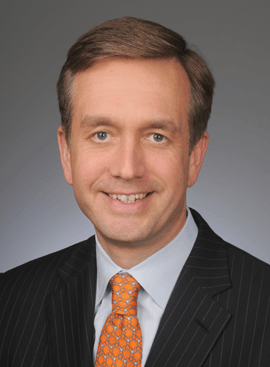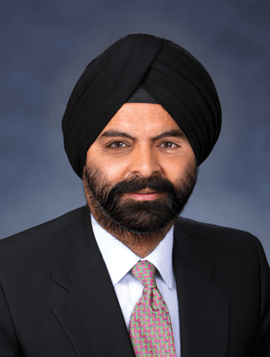
I have responsibility for global diversity for Mastercard. Our chief diversity officer reports to me, along with a team of four professionals. The origin of that comes straight from the top – Ajay Banga our CEO believes diversity should be the responsibility of someone with a global business leadership role. He doesn’t want diversity to only be viewed as an HR function. Then, people put it in a box and think about it in a partial or nice to have way, rather than as the core business enabler it can be. We wanted to create a context where diversity and inclusion is driven in partnership with HR, but as a truly strategic function of leadership.
A significant driver for this is the tone from the top. That comes both in the form of messaging, as well as the business case for inclusion – making it clear that both internally and externally, diversity and inclusion are tied to our overarching strategy. We embrace diversity across all its variables: experience, life stage, gender, ethnicity, sexuality, which leads to a round table way of making decisions – which I genuinely believe are better decisions.
A key business aim fundamentally linked to diversity and inclusion is our work on financial inclusion globally. Financial inclusion and inclusive growth – which creates opportunities for all segments of the population to participate in the formal economy – is a way of driving our corporate strategy into the 21st century and beyond. If we only focus on individuals who already have access to financial services, we limit our growth trajectory; if we focus on those who do not have banking or other financial accounts, we open ourselves to more growth. Diversity and inclusion is therefore helping the company engage more widely and with a broader audience – that speaks to how diversity is helping to drive our business strategy. In a fundamental sense, the company cannot do what it needs to do in regards to inclusive growth without diversity.
There are two billion people globally who don’t have access to basic financial services. We are committed to a leadership agenda in concert with the World Bank and the United Nations to provide electronic payment services to 500 million new consumers globally by 2020. Much of the focus for this has been in electronic benefit distribution. Most social benefits are still distributed in paper form, which contributes to fraud and waste. By distributing social benefits in an electronic payment scheme, it can enhance the benefit to everyone – both the people who receive it, along with cost and efficiency factors for government providers.
We have a series of initiatives working with governments to drive the scale of electronic payment programmes. In South Africa, social security benefits are now distributed on an electronic card. In Egypt we have a biometric system to connect citizens’ national IDs to the existing national mobile money platform, which will give 20 million people access to an electronic payment system. Currently Mastercard enables the electronic disbursement of aid for Syrian refugees in Serbia and Greece, as well as for those affected by disasters around the globe. This is what the modern consumer needs and is of value in so many different ways.
There’s an amazing initiative in this space in India, where the government is undertaking a program of electronic identity. It’s also forming the basis for an electronic payment system and the way we get at it is really interesting.
One of the significant aspects of what we are doing with diversity and inclusion is the development of our own thought leadership in this space. In 2013, we launched the Mastercard Center for Inclusive Growth, a think tank whose mission is to empower people through inclusive economies by supporting academic research and strategic philanthropic investments. This team also reports to me. We’re working with key thinkers in this space, Laura Tyson at Berkeley and Ricardo Hausman at Harvard and the Bruegel centre in Brussels on how we can advance inclusive growth. I was just in Brussels working with Bruegel on what we can do with the EU in furthering financial inclusivity.
But you may ask where do the lawyers come in? The legal team has a huge part to play! All of this creates an incredibly complicated and exciting way to think about issues, most of which have legal and regulatory ramifications. We are leading the way on data philanthropy, leveraging our expertise in data analytics to help governments and NGOs create programmes to bolster inclusion. Our lawyers are playing a leading role in creating these programmes and it’s exciting because we are involved in both the creation and the implementation.
I have been struck by how productive it is to make a commitment and have a meaningful contribution in an area such as financial inclusion and then let the organisation innovate in close collaboration with lawyers and policy experts in this space. For many of our lawyers there is the opportunity to work part time or to volunteer in these policy driving areas, which is really motivating. Lawyers will often have policy accountability within their companies, so there’s a real opportunity for legal teams because they have expertise in this space.
AJAY BANGA, CEO AT MASTERCARD, ON DIVERSITY
Diversity is foundational to who we are and what we do at Mastercard. It drives our collaboration, our talent development, our innovation, and our results. In short, diversity matters.
Diversity is what drives better insights, better decisions, and better products. It’s the backbone of innovation. It’s what defines a great leadership culture.
If you looked at the United Nations and similar NGO events, fifteen years ago the private sector was excluded. But about ten years ago, NGOs started to consider what we do and then five years ago we were invited to events. Now, non-profits and NGOs understand that solutions to big problems will come from public-private partnerships, but to achieve scale on these initiatives we need to create profitable, sustainable business models. This is where lawyers can really play a meaningful role in negotiating the needs of not-for-profit and commercial sectors, in order to help our companies to be successful and socially meaningful.
Thinking about this as a business leader, whatever your sector or size, is there an opportunity for a public-private partnership? Is there a way to put people on this, even in a part time or voluntary basis? You will find people will really embrace it – there’s something very stimulating in building a company which explicitly includes a social progress commitment and making it meaningful, which then ripples out into all areas of work.
This interview will also appear in the GC Diversity and Inclusion Report USA, to be published in January in association with Paul Hastings.




